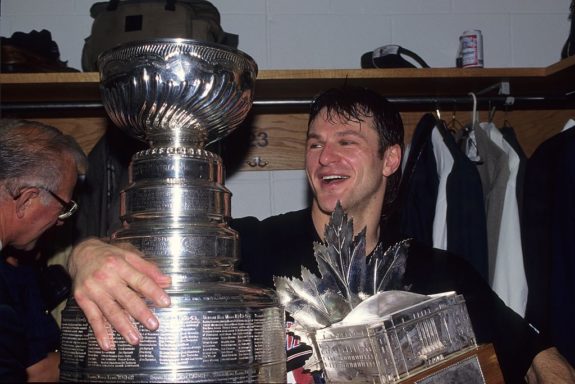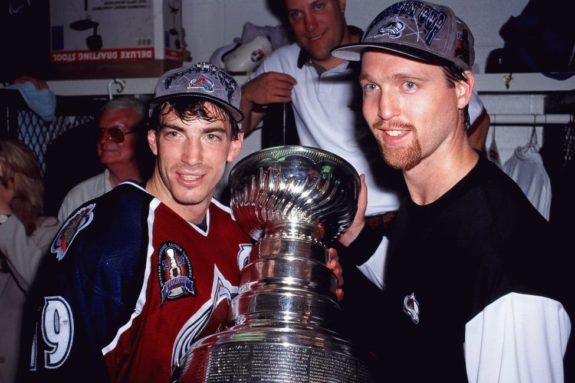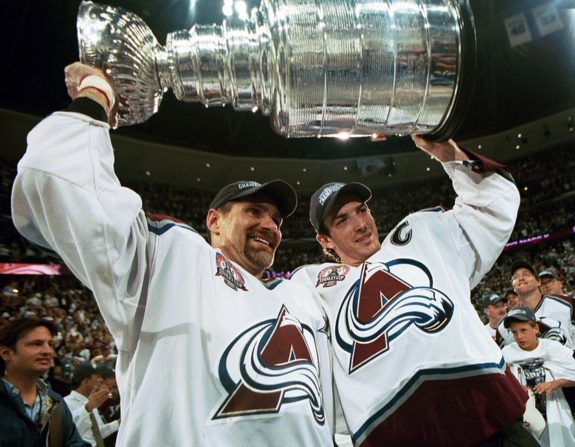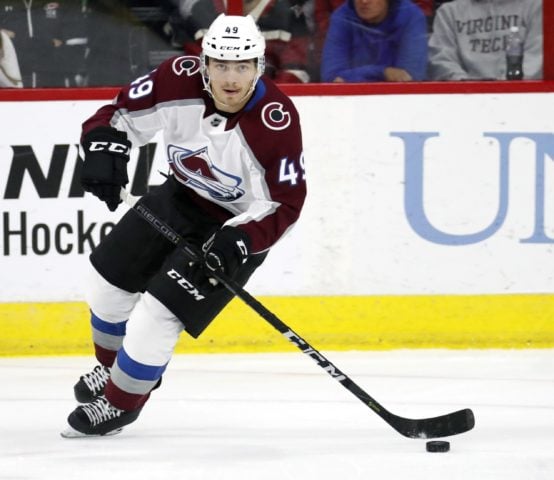Over the past 25 seasons since they moved from Quebec in 1995, the Colorado Avalanche have made a handful of trades whose legacy was felt for seasons after the transaction itself. This list will discuss the five franchise-defining trades in Avalanche history (not Quebec Nordiques, so the Peter Forsberg/Eric Lindros trade does not appear).
Before we jump into the rankings, I want to explain something about my methodology. As you’ll see, I do not count it against the Avalanche when they give up first- or second-round draft picks. The Avalanche were so bad at drafting during 1999-2008 that they might as well have given the picks away because they couldn’t be trusted to do anything productive with them themselves. I don’t want to belabor this point too much – and I might dedicate an entire article to it in the future – but Table 1 shows how awful the Avs were at drafting during that span.
Table 1. Average NHL & Avalanche Picks in the 1999-2008 NHL Entry Drafts
| 1999-2008 NHL Entry Drafts | Games Played | Goals | Assists | Points |
| Average Avalanche Draft Pick | 117 | 18 | 29 | 47 |
| Average NHL Draft Pick | 303 | 45 | 120 | 165 |
| Average Avalanche 1st Round Pick | 317 | 59 | 106 | 165 |
| Average NHL 1st Round Pick | 508 | 97 | 156 | 253 |
The Avalanche ranked 22nd in average first-round selection career points (165) and averaged selecting at the 20th spot in the first round. The Ottawa Senators also averaged selecting at 20th during this span and their average first round pick scored 311 points in his career. The Avalanche were more a victim of their own front office rather than of circumstance. Now, here are the five all-time best Avalanche trades in chronological order.
Claude Lemieux
Avalanche acquired LW Claude Lemieux; New Jersey Devils acquired RW Steve Thomas; New York Islanders acquired C Wendell Clark on October 3, 1995.
The Brawl. (from ’20 years later: Red Wings vs. Avalanche fight night is still the best,’ Detroit Free-Press, 03/23/2017) The Kris Draper hit. Claude Lemieux was as known for instigating a violent rivalry with the Detroit Red Wings as he was for his playoff leadership. He was an integral part of the Avalanche’s early franchise success in Colorado. The team won the Stanley Cup in his first season with the franchise (1995-96) and they won the division in each of the next four seasons (1996-97 to 1999-00). In 1996, Lemieux became the 10th NHL player to win the Cup in two consecutive seasons on a different team each time.

His tenacity and ability to get under the skin of opponents was a big reason why the Avalanche and the Detroit Red Wings began their fierce rivalry during Lemieux’s tenure in the Rockies. He was traded back to the New Jersey Devils along with a smattering of conditional and swapped picks on November 3, 1999 for Brian Rolston, who would become part of Avalanche history lore in his own right a few months after the trade (more on him later).
Related: Little Known Facts About the Stanley Cup
Lemieux was the perfect acquisition to instigate this successful run, given that he was the defending Conn Smythe Trophy winner for the defending Stanley Cup champions, New Jersey Devils. He brought with him 136 playoff appearances and two Stanley Cup championships, 40 of those playoff games in just the previous two seasons with the Devils.
He was a very aggressive, goal-scoring power forward who was a heavy hitter along the boards. The Avalanche and Red Wings battled in the 1996 and 1997 Western Conference Finals and met again in the 1999 Divisional Round. Lemieux’s infamous check-from-behind that exploded Kris Draper’s soul in the 1996 playoffs is still talked about 20 seasons later. Darren McCarty cites that hit as the instigator for the long-time McCarty-Lemieux feud that fueled the Avalanche-Red Wings rivalry.
Point Shares (PS) is a metric that quantifies how a player’s even-strength play in the offensive and defensive zones translates into scoring. In the end, the Lemieux’s production of 21.3 PS in just over four seasons with Avalanche compares very similarly to the past four seasons of Gabriel Landeskog (23.5 PS, including the shortened 2019-20 season).
Patrick Roy
Avalanche acquired G Patrick Roy and RW Mike Keane; Montreal Canadiens acquired RW Andrei Kovalenko, LW Martin Rucinsky, and G Jocelyn Thibault on December 6, 1995.
It was the worst kept secret that Patrick Roy wanted out of Montreal in 1995. Roy won the 1986 and 1993 Stanley Cups with the Canadiens, both times winning the Conn Smythe Trophy as playoff MVP. But four games into the 1995-96 season, the Canadiens hired Mario Tremblay as head coach, who often feuded with Roy when they were Montreal teammates. In fact, rumor has it that Roy and Tremblay almost duked it out in a Long Island, NY coffee shop a few days before Tremblay was hired.
Their bad blood boiled over on December 2, 1995 when Tremblay left Roy in net for nine goals during an 11-1 home loss against the Red Wings. Upon his exit from the ice, Roy famously told Canadiens President Ronald Corey, “this is my last game for Montreal,” getting himself suspended by the team the following day and traded four days later to the Avalanche.

As if losing hometown hero Roy wasn’t enough, the Canadiens received a fairly paltry return for Roy and then-captain Keane. The trade was always going to be judged on the value of the netminder Montreal received. A 1993 first-round draft pick, Thibault was the Avalanche’s starting goalie in 1995-96. He didn’t have much NHL experience coming into the season – 47 appearances across two seasons – but had a strong lockout-shortened 1994-95 for Colorado (12-2-2, 0.934 save percentage, 2.34 GAA).
Unfortunately for Montreal, he would never approach those numbers for them; while on the Canadiens, his best GAA was 2.47 (1997-98) and his best save % was 0.913 (1995-96). Thibault played parts of four seasons with Montreal, finishing with a 67-56-24 record. The rest of the Roy trade package for Montreal was serviceable, if unspectacular.
Related: Top 3 All-Time Canadiens Goalies
Rucinsky produced dividends right away as he scored over a point-per-game in 1995-96 for Montreal (60 points in 55 games), but then averaged in the mid 40-point range for the rest of his six seasons-plus tenure with the club. Kovalenko spent the rest of 1995-96 with the Canadiens then was traded to Edmonton in the offseason, retiring from the NHL after the 2000-01 season.

Roy’s noteworthy Hall of Fame career speaks for itself and his acquisition was a major reason why the Colorado Avalanche won two Stanley Cups during his career in Denver.
Ray Bourque
Avalanche acquired D Ray Bourque and LW Dave Andreychuk; Boston Bruins acquired LW Brian Rolston, prospects D Martin Grenier and LW Samuel Pahlsson, and the Avalanche’s 1st-round pick in the 2000 NHL Entry Draft on March 6, 2000.
This was the trade that finally got Ray Bourque’s name on the Stanley Cup. However, that feat was not accomplished the season in which Bourque was traded to the Avalanche but the one following (2000-01). In 2000, the Avalanche lost Game 7 in the Western Conference Final to the Dallas Stars, showing Bourque that there was a real possibility of winning the Cup with the Avalanche.
Bourque signed a one-year deal with the Avalanche with an option for a second less than three weeks after the season ended. Fast-forward 11 months and Bourque finally hoisted the Cup after 22 seasons and retired a champion.

The Bruins made this trade to give Bourque the opportunity to win the Cup, but the team still received a pretty good return on an asset the NHL knew it was looking to unload. At the time, it was an impressive haul for what could have turned into a partial season return from Bourque had the Avalanche won the 2000 Stanley Cup.
Related Page: Ray Bourque – A Long Way to the Stanley Cup
Unfortunately for Bruins fans, the Bruins front office drafted even more poorly than the Avalanche did during 1999-2008 (the average Bruins draft pick scored 131 career points, 27th most in the NHL), and 2000 was no exception. The draftee the Bruins selected with Colorado’s first round pick – Martin Samuelsson – played a total of 14 career NHL games.
Rolston floundered in his role with the Avalanche, scoring 18 points in 50 games, but turned in a little more than four strong seasons for the Bruins, averaging 56 points per season and accumulating 25.3 PS. None of the prospects acquired panned out in the NHL, and Andreychuk contributed little to the Avalanche.
In a little over a season with the Avalanche, Bourque produced 13.6 PS, more or less equal to Mikko Rantanen during 2018-20 (14.2).
Rob Blake
Avalanche acquired D Rob Blake and C Steve Reinprecht; LA Kings acquired LW Adam Deadmarsh, D Aaron Miller, and two Avalanche 1st-round picks in the 2001 & 2003 NHL Entry Draft on February 22, 2001.
In 2001, the Kings were unwilling to pay soon-to-be unrestricted free agent Rob Blake the reported $10 million-a-season contract for which he was looking. (from ‘Blake Traded to Avalanche,’ Los Angeles Times, 02/22/2001) At the trade deadline, they traded him and young third-line center Steve Reinprecht to the Avalanche for a package that primarily contained power forward and postseason dynamo Adam Deadmarsh, quality US-born defenseman Aaron Miller, and two first-round picks (2001 and 2003).
Acquiring defenseman Rob Blake at the 2001 trade deadline solidified the Avalanche as the Stanley Cup front runner heading into the playoffs. The team already had the best record in the NHL (38-12-9-2, 87 points) so the rich became richer with Blake. The Avalanche went on to win the 2001 Presidents’ Trophy, finishing the regular season with an NHL-best 118 points.

During the 2001 playoffs, the Avalanche paired Blake with Ray Bourque to form one of the best defensive tandems of all-time. The Avalanche beat the seven-seed Kings in the Western Conference Semifinals in seven games, with Blake contributing three goals and an assist in the series. All told, Blake scored 19 points in 23 postseason games, helping the Avalanche win their second Stanley Cup in five seasons.
The Avalanche then signed Blake to a five-year extension with an option for a sixth after the season on July 1, 2001. The two first-round picks would have been a hefty sum for the team to pay for just a postseason rental had they not come to terms with Blake. Fortunately for the Avalanche, winning a Stanley Cup has a way of keeping players on a team.
In five seasons with the Avalanche, Blake racked up 40.6 PS in just over four seasons with the Avalanche, having lost a contractual season in 2004-05 due to the lockout. For reference, Nate MacKinnon has accumulated 45.3 PS over the past five seasons (including the shortened 2019-20).
Matt Duchene
Avalanche acquired D Samuel Girard, C Vladislav Kamenev, G Andrew Hammond, prospect C Shane Bowers, the Nashville Predators’ 2nd-round pick in the 2018 NHL Entry Draft, and the Ottawa Senators’ 1st-round and 3rd-round picks in the 2019 NHL Entry Draft; Predators acquired C Kyle Turris; Senators acquired C Matt Duchene on November 5, 2017.
The 2016-17 season was one of the more troubling ones in Avalanche history. A month before the season started, head coach Patrick Roy resigned from the club. Jared Bednar was hired from outside of the organization to replace the Hall of Fame goalie as Avalanche head coach, and the team struggled in the transition.

To complicate things further for the front office and no doubt the locker room, top forward Matt Duchene requested a trade out of Colorado in December 2016. Per Bruce Garrioch of Postmedia:
I wanted to play playoff hockey. I’ve got eight playoff games to my name right now and that’s not where I want to be at this point of my career. I only get one shot at this. I get to play this game for however long my body lets me play it and I felt I wanted to let Joe know it was time to move on.
from ‘Matt Duchene thrilled at getting a chance to win with Senators,’ Ottawa Sun, 11/06/2017
The Avalanche finished dead last in the NHL at the end of 2016-17 and had a major decision to make heading into 2017-18. Duchene’s contract was set to expire in the summer of 2018. Trading him could bring in a massive haul for the Avalanche if GM Joe Sakic found the right buyer but surely it would weaken the on-ice product, again setting up Bednar with a challenging situation. Eventually, Sakic’s patience paid off, and Duchene was traded to the Senators almost a year after his initial request as part of a three-team trade that saw the Avalanche receive a bounty of players, picks, and prospects.
Essentially, the package gave the Avalanche a potential offensive defender stalwart (Girard), three lottery picks, the flexibility to make future acquisitions, and a couple of dart throws in Kamenev and Hammond. The effect of this trade is still felt in three major ways in Colorado.
Girard has developed into one of the best blueliners at both ends of the ice. He’s seen his average ice time increase from 17:42 in 2017-18 to a team-high 21:14 in 2019-20. At the time of the coronavirus suspension, Girard was the Avalanche’s second-ranked defenseman in terms of Offensive PS (2.0) behind only Cale Makar (4.8).
Additionally, this season he had set career-highs in scoring (34 points), shooting %, blocks, and takeaways. Sakic seemed to know what was coming, so he signed Girard to a seven-year, $35 million extension in July 2019 that begins this coming season (2020-21).

Secondly, Sakic actually acquired two franchise defensemen from the deal. He turned the first round pick in the 2019 NHL Entry Draft from the Senators into uber-prospect Bowen Byram, who just won his minor league team’s MVP award for the second straight season. Byram’s highlight reel looks like a carbon copy of Makar’s rookie season.
The addition of Byram to the Avalanche next season is going to give the team an embarrassment of riches, especially now that prospect Shane Bowers looks ready to push for a major league roster spot in 2020-21. For more on him, check out my colleague Nick Haydon’s Avalanche prospect report below.
Related Pages: 11 Exciting Colorado Avalanche Prospects
The final part of the trifecta turned out to be Nashville’s 2018 second round pick. Seven months after completing the Duchene trade, Sakic traded away both of the team’s second round picks for goalies: its own pick (#47 overall) to the Washington Capitals for G Philipp Grubauer and D Brooks Orpik, and then traded the one from Nashville (#58) to the Pittsburgh Penguins for picks #64 and #146. With pick No. 64, Sakic drafted G Justus Annunen, currently one of our top netminder prospects. At the time of selection, NHL Central Scouting ranked him as the fourth best goalie in the 2018 Entry Draft.
The cherry on top was that despite both the Avalanche and the Senators being in the top eight in their respective conferences, only the Avalanche made the postseason in 2017-18. Duchene would need to wait one more season until 2018-19 and change zip codes to Columbus, OH before playing playoff hockey again.